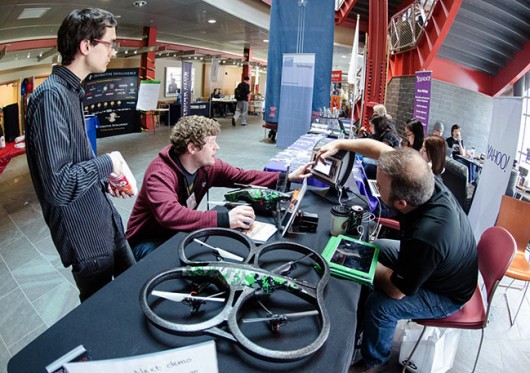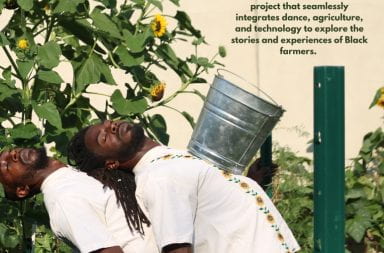
Hackathons like HackIllinois draw computer programmers, interface designers and other software and hardware development-related enthusiasts together to produce projects under an intensive deadline. The 2014 HackIllinois event at the University of Illinois, photographed above with a fisheye camera lens, will play host to a group of OSU students in 2015. Credit: Courtesy of Priten Vora
Josh Kuehn didn’t do well during his first hackathon, but that didn’t stifle his inspiration to help make what he calls the “tech culture” at Ohio State bigger.
The 36-hour OHI/O hackathon in Fall Semester 2014 was Kuehn’s first experience with a hacking marathon, and he said he got so absorbed with programming and coding that he didn’t sleep much during the event.
“It’s all about starting with nothing, or starting with very, very little, and actually building a product, an application, and I was just very excited about it,” said Kuehn, a first-year in computer science and engineering.
This weekend, he will attend HackIllinois, a hackathon hosted by the Computer Science Department of the University of Illinois. Kuehn has more experience in coding under his belt , something he said he hopes will allow him to perform better.
Kuehn said he already knew Java and C++, two commonly used programming languages, from his days in high school, and his knowledge of programming languages has continued to grow through his firsthand experiences in both hackathons and his free time.
“If somebody sits there and gives you an hour-long lecture that says, ‘OK, this is how you write HTML,’ you’re going to forget all those tags,” Kuehn said. “It’s when you sit there and play with it … that’s how you learn how to solve (problems in coding).”
A hackathon brings together computer programmers, interface designers and other people related to software and hardware development and has them produce projects in a certain intensive time frame. Students tend to work in groups at hackathons.
After his first hackathon, Kuehn immersed himself in the culture, driving him to start Buckeye Hackers, a student organization dedicated to having a presence in hackathons in the region and eventually around the world.
Going into a hackathon, Kuehn said getting a good night’s sleep beforehand is one of the most important things to do, because most events last more than 24 hours. Beyond that, preparations before hackathons involve knowledge accumulated over time as well as having a desire to learn.
“A lot of it is learning as you go,” Kuehn said. “But it’s also being prepared to learn.”
Shashank Agarwal, a graduate student studying computer science and engineering, is a hackathon veteran and has won at least one prize at all four of the events he has attended. As an experienced hackathon attendee, he knows what it’s like to be at a hackathon.
Agarwal said groups should take an hour or two to decide what they want to do before working on anything at the event. He said this step is crucial and shouldn’t be done too quickly, but also shouldn’t take too long.
Agarwal also said it’s important to finish as much as possible in the first 24 hours of any hackathon because errors and bugs will always appear and need to be fixed. He added that errors can be avoided by practicing time management and teamwork.
“Usually you try to do your work and then sleep when someone else is doing the work,” he said. “A lot of Red Bull and coffee is involved in the process. They’re the essential fuels.”
He will also attend the second annual HackIllinois event, which starts Friday at 10 p.m. and ends Sunday at 10 a.m.
Agarwal, who serves as the OSU ambassador to HackIllinois, said he is the OSU point of contact for the event. He attended the event last year, winning an award for his application called Get the Answer, which could take a picture of an object and tell the user what the object is.
Kuehn said he looks forward to picking more people’s brains at HackIllinois and seeing what other projects people are going to make.
“One of my favorite things is just looking at what people do, and seeing other people’s projects is always cool because people do some crazy things,” Kuehn said, mentioning specifically a portable shower that was developed at the OHI/O fall hackathon.
He said he will attend HackIllinois with his same OHI/O hackathon team, made up of four people.
HackIllinois judges will determine the winners in separate software and hardware categories during a science fair open to the public after the hackathon ends, said Nathan Handler, the director of HackIllinois this year.
The top three software and top three hardware projects, as decided by the HackIllinois judges, will earn technology and cash prizes from HackIllinois, but companies that are involved in the event, including Apple, Answers and Interactive Intelligence, can give away their own prizes based on their own judgments, Handler said.
The first HackIllinois event that happened last year led to projects like a microwave that was controllable through Wi-Fi.
Another project was an app for Pebble smartwatches that allows owners to silently answer multiple-choice questions by tilting their wrist in four different directions to choose one of four choices. The users would be able to send their choice to other users in a room, which could aid in answering questions on exams, Handler said.
“It got a wide reaction since Pebble just donated a thousand smartwatches to the university,” Handler said. “It wasn’t as popular with the teachers, though.”
Despite HackIllinois being open to students from other schools, attendees won’t be divided by school affiliation, Handler said. Everyone is free to team up with whoever they wish and produce whatever projects they can pursue.
Kuehn said he hopes the hackathon’s attendees will come away with a new appreciation for the possibilities of technology.
“Never underestimate what you can do with a passion and an Internet connection,” Kuehn said.


